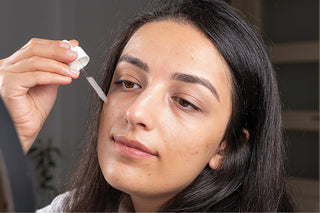Effective Care for Acne and Acne Scars with Bee Venom and Anatolian Propolis!
Acne and acne scars affect 80% of young people! Bee Products Expert Dr. Asli Samanci notes that acne and acne scars are common skin problems, especially during adolescence. Research indicates that around 80% of young people between 11 and 30 experience this problem. Sebum, a greasy substance, is produced in the skin where hair follicles and oil glands are located. This substance helps maintain the skin's moisture balance by moving toward the surface. However, stress, diet, hormone levels, and genetic factors can cause excessive sebum production, accumulating dead skin cells and sebum, resulting in acne and acne scar formation. Propionibacterium acnes, a type of bacteria that lives on our skin, also plays a significant role in the formation of acne. Scientific studies show that bee products such as propolis and bee venom can be effective against acne and acne scar problems.
Bee Products Expert and Food Engineer Dr. Asli Samanci explains the effectiveness of Propolis and Bee Venom against Acne and Acne Scars!
"In a single-center double-blind, randomized, placebo-controlled scientific study conducted in 2018 to reduce antibiotic use, a cream containing propolis, aloe vera, and tea tree oil was evaluated in treating acne problems in oily skin. The study included 60 participants, with mild to moderate acne problems, who were randomly divided into three groups. Group 1 was treated with a cream containing 20% propolis extract, 10% aloe vera, and 3% tea tree oil. Group 2 was treated with a cream containing 3% antibiotics. Group 3 consisted of 20 people who received no treatment. In the beginning, after 15 and 30 days, the researchers evaluated the response to treatment by counting acne scars non-invasively and through macro-photography. The study results showed that the cream containing propolis was as effective as the antibiotic cream in reducing skin redness and scars and accelerated the healing process in a short period of 15 days. It was also reported that the cream containing propolis was as effective as the antibiotic cream in reducing the acne severity index and the total number of scars.
Dr. Samanci states that Propionibacterium acnes is effective in all stages of acne formation, even though its exact mechanism of action is unknown. She also cites scientific studies that reveal the antibacterial effects of bee venom against the bacteria responsible for acne formation. "In a double-blind, randomized scientific study conducted in Korea in 2013, the antibacterial effectiveness of bee venom on acne was investigated. The study involved incubating Propionibacterium acnes with bee venom at various concentrations and evaluating bacterial growth. Additionally, 12 volunteers were randomized to apply a dermo-cosmetic mixture containing bee venom or a dermo-cosmetic mixture without bee venom for two weeks. The lesion counts and skin microorganism growth were followed. The study data showed that bee venom exhibited antimicrobial activity in a concentration-dependent manner and reduced the number of P. acnes colonies by about six times. When the concentration of bee venom was higher than 1.0 mg, no P. acnes colonies remained on the agar. Compared to the control group, a significant improvement was observed in the group using the dermo-cosmetic mixture containing bee venom in terms of inflammatory and non-inflammatory lesion counts. The data from the study show that bee venom has positive effects on acne and acne scar reduction in both in vivo and in vitro environments."
An Effective Fight Against Acne and Acne Scars is Extremely Important!
Dr. Samanci emphasizes that acne and acne scars usually occur in oily areas of the skin, such as the face and back. These problems, especially during adolescence, can cause young people to lose self-confidence and become depressed. Therefore, an effective fight against acne and acne scars is critical. Effective skincare steps for acne-prone skin include:
- Cleansing with natural, suitable dermo-cosmetic products.
- Using sun protection.
- Choosing appropriate makeup products.
It is recommended to cleanse the skin in the morning and evening, use appropriate moisturizers, and apply sun protection with SPF 50+ for individuals with acne-prone skin. Natural sunscreens are preferred for those prone to acne and acne scars. Incorporating bee products such as propolis and bee venom into skincare routines can effectively reduce the severity of acne and acne scars."
Sources:
- Sarıcaoğlu H, Karadoğan SK. Skin care and cosmetic selection in acne. Turkey Clinics J Int Med Sci 2006;2:55-60. https://turkdermatoloji.org.tr/media/files/file/akne-kitabi.pdf
- https://bilimteknik.tubitak.gov.tr/system/files/makale/623_bilim_ve_teknik_2019_ekim_51.pdf
- Mazzarello V, Donadu MG, Ferrari M, et al. Treatment of acne with a combination of propolis, tea tree oil, and Aloe vera compared to erythromycin cream: two double-blind investigations. Clin Pharmacol. 2018;10:175-181. Published 2018 Dec 13. doi:10.2147/CPAA.S180474
- Han, S. M., Lee, K. G., & Pak, S. C. (2013). Effects of cosmetics containing purified honeybee (Apis mellifera L.) venom on acne vulgaris. Journal of integrative medicine, 11(5), 320–326. https://doi.org/10.3736/jintegrmed2013043

